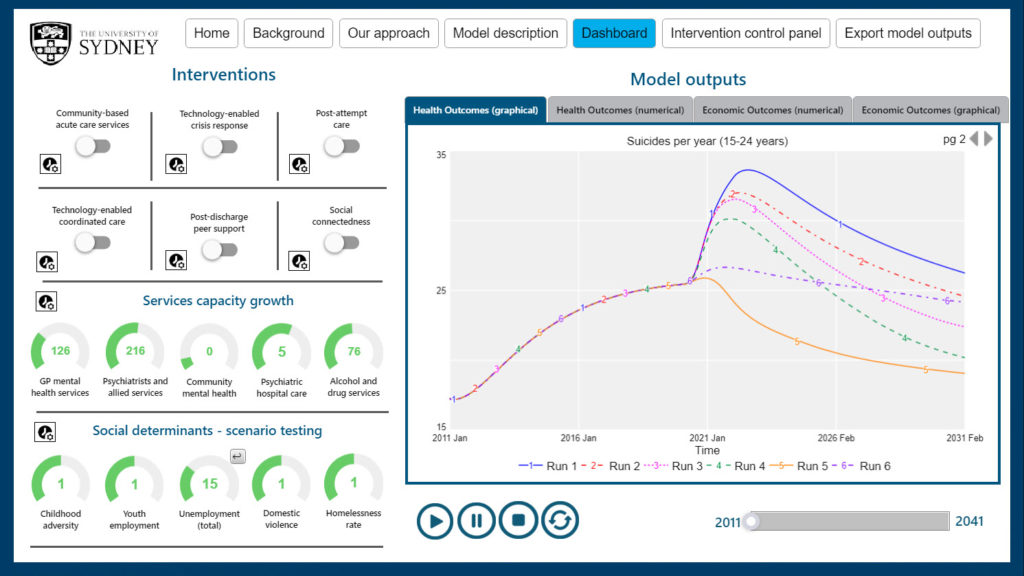
As the COVID-19 pandemic is demonstrating, systems modelling can provide powerful decision support capability to help governments successfully navigate complex and evolving public health crises.
In countries such as Australia and New Zealand, governments at national and state levels worked closely with scientists, using systems models as virtual testing grounds for different combinations of public health measures, implemented at different times, and for different durations, geographical regions, and stages of disease transmission.
This helped reduce real-world trial and error and informed timely, decisive, and effective responses to the pandemic, saving tens of thousands of lives in Australia.
Many countries and international agencies now recognize the significant impact COVID-19 and the attendant global recession will have on mental health, with disruption of critical mental health services and increases in psychological distress, alcohol and other drug misuse, domestic violence, and suicidal behaviours.
The looming crisis is such that it has been termed ‘a shadow pandemic‘, with young people, women, and the socio-economically disadvantaged most affected.
We have seen that when motivated and informed by modelling and simulation, governments can respond proactively and effectively to physical health threats. It remains to be seen whether the mental health threat will be addressed with comparable rigor and vigor.

Even in Australia where systems modelling is widely known to have played a key role in informing the effective response to COVID-19, and where mental health challenges were signalled early, government responses to the mental health threat disappointingly defaulted to a traditional approach akin to flying blind.
The investments made have been reactive rather than strategic, formulated “on the run”, based primarily on what seemed to represent sound evidence-based decision making, but devoid of estimates of the impact the actions are likely to have.
The science of complex systems reveals the deficiencies that emerge from relying simply on estimates of impact based on highly controlled trials or evaluations of individual programs. Recent applications of systems modelling in mental health services planning and suicide prevention reveal insights into why evidence-based programs and initiatives can be ineffective, or even counterproductive when introduced into complex systems.
For example, a validated and peer-reviewed systems model developed for the rural population catchment of Western New South Wales, Australia, demonstrated that introducing general practitioner training (effective at improving GP recognition of suicide ideation and referral to appropriate services) together with mental health education programs (effective at improving mental health literacy and help-seeking), could, paradoxically, lead to an increase in suicide deaths in the region.

This unexpected finding was explained by a lack of service capacity to meet the increase in service demand that would be generated by this combination of evidenced-based initiatives, leading to service disengagement, increased duration of psychological distress, and increased suicide risk. While unexpected, the findings reflect the lived experience of many who seek help for mental health issues.
Systems modelling applications tackling alcohol-related harms found that some combinations of evidence-based interventions were projected to deliver synergistic effects (where the impacts of combining early closing of licenced venues with ‘lockouts’ and an expansion of treatment services for heavy drinkers were projected to be greater than the sum of their individual effects).
Finally, a suicide prevention model developed for a metropolitan catchment highlighted important threshold effects (a dynamic ‘tipping point’) in the relationship between the availability of psychiatric beds and rates of suicide that depends on the capacity of community-based specialist mental health services.
These examples highlight that planning to effectively mitigate the impact of the pandemic and recession on mental health and suicide outcomes will depend on an understanding of the critical balance and timing of implementing combinations of new programs and services, alongside the strengthening of existing service capacity in a given context.
To effectively respond to the looming crisis, researchers and decision-makers will need to move beyond simply relying on studies of the effectiveness of individual programs and initiatives and understand the behaviour of complex real-world systems that do not necessarily respond as anticipated to what may seem like sound, evidence-based solutions.

Systems modelling leverages a broad range of existing data and research evidence, but importantly captures system complexity; accounting for changes over time in demography, behavioural factors, health service capacity and demand-supply dynamics, real-world sources of inertia and delay, feedback loops, and intervention interactions and constraints.
BMC Medicine’s current focus on Complexity in Mental Health Research is timely and welcome. The series features systems modelling of the social determinants of youth mental health and suicide, work that is contributing to the Rockefeller Foundation-Boston University 3-D Commission which is showcasing best ways to leverage research evidence and data to support decision making.
In capturing the social determinants, the systems model was able to be rapidly adapted to simulate COVID-related unemployment and social dislocation, forecast Australia’s mental health trajectory and service demands over the next 5 years, and test proposed economic, health, and social measures to avoid that trajectory.
Being able to draw on this existing modelling infrastructure to respond to emerging health crises is an advantage that governments should seek to develop for future service planning.
The BMC Medicine complexity series and 3-D Commission are providing an important springboard for the promotion of more routine applications of systems modelling and helping to realise a paradigm shift in mental health research, policy, and planning.
As nations are considering how best to respond to the ‘shadow pandemic,’ there has never been a more important time to engage with the advanced analytic tools of complex systems science.
Comments